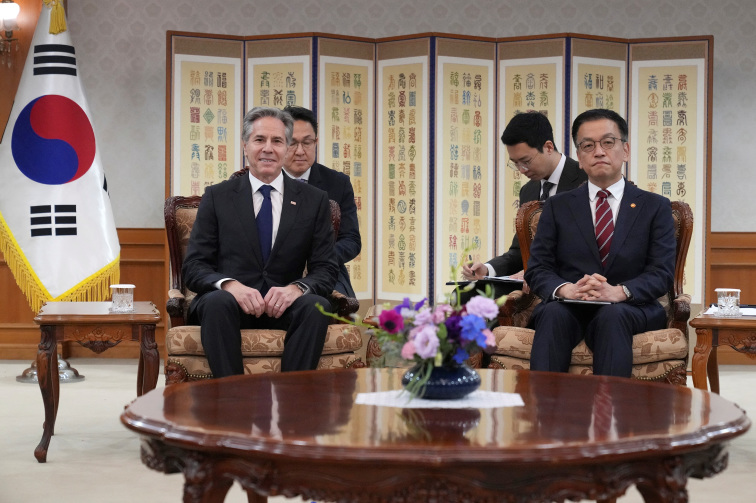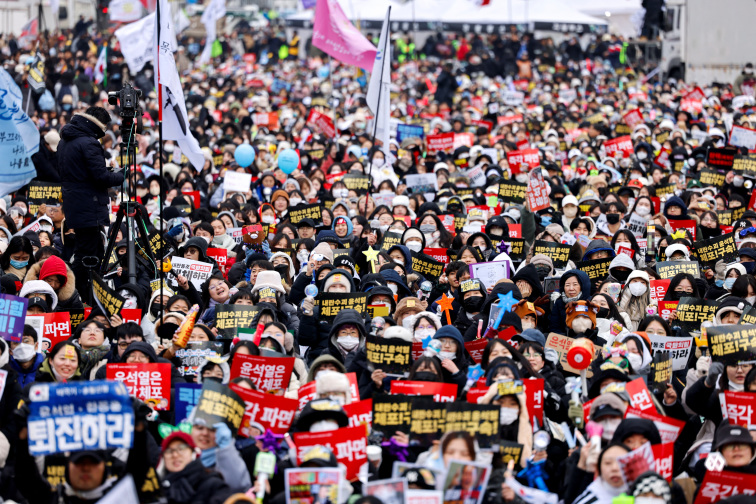In October 2025, South Korea saw consecutive days of anti-communist demonstrations protesting President Lee Jae-myung’s decision to grant visa-free entry to Chinese tourists. (Video screenshot)
[People News] The Asia-Pacific Economic Cooperation (APEC) summit is about to be held in Gyeongju, South Korea, but in recent days, the capital city of Seoul has been gripped by anti-communist protest rallies. This has left current President Lee Jae-myung deeply troubled, as he worries the protests could affect future cooperation between China and South Korea. Meanwhile, CCP leader Xi Jinping’s last-minute reversal regarding his hotel booking has triggered fierce criticism from South Korea’s opposition parties.
Lee Jae-myung Ignores Public Outcry
According to South Korean media reports, as an elected president, Lee Jae-myung has faced strong anti-communist sentiment from the public but has refused to respond to popular demands. Instead, he reportedly told senior aides that such actions must be thoroughly eliminated, claiming they “harm South Korea’s interests and tarnish the nation’s image.” Lee argued that modern South Korea is already recognised as a cultural powerhouse and should not turn a blind eye to behaviour that damages its national standing. He ordered relevant ministries to quickly draft strong measures to suppress such street protests and to ensure that these demonstrations do not pose any threat to foreign tourists. What he failed to consider, however, is whether these counter-popular policies would provoke resentment among South Korean citizens.
According to Storm Media, South Korean television broadcasts showed that most recent protests targeting the CCP were organised by far-right groups. With the newly announced visa-free policy for Chinese tour groups and the upcoming APEC summit, the protest atmosphere has only grown more intense.
Major protest sites in Seoul included Myeong-dong, where the Chinese embassy is located, as well as neighbourhoods with large Chinese and Korean-Chinese populations. Popular tourist destinations frequented by Chinese visitors, such as Hongdae, also saw demonstrations.
Protesters shouted slogans such as “China Out” and “Eradicate Communism.” Some burned or tore up Chinese flags featuring Xi Jinping’s portrait.
On October 3, about 3,000 people marched in Seoul from Dongdaemun Station toward Gwanghwamun. They waved Taegukgi (South Korean national flags), American flags, and carried red balloons printed with “We are Charlie Kirk.” Along the way, they chanted slogans like “CCP Out of Korea,” “Arrest Lee Jae-myung,” and “Release President Yoon.”
The protest march also included offensive slogans targeting Chinese nationals and North Korean residents. Signs referencing “fraudulent elections” were also displayed.
Xi’s Flip-Flop Infuriates South Koreans
Meanwhile, reports emerged that Xi Jinping, who plans to attend the APEC summit, had initially intended to stay at the Shilla Hotel in Seoul. As a result, the hotel abruptly informed several couples that their wedding banquets were cancelled due to a “national event.” The cancellations left the couples in distress. But later, the CCP suddenly cancelled the reservation, forcing the hotel to scramble to reinstate the weddings—prompting a storm of criticism from opposition lawmakers.
According to the Korea Economic Daily, ruling-opposition lawmaker Sung Il-jong of the People Power Party posted that the incident amounted to “the Chinese government treating South Korea’s goodwill as a joke.” He noted that it even ruined young couples’ weddings, and yet not even a cancellation fee was paid. He further questioned whether the South Korean government had pressured the Shilla Hotel to prioritise the CCP’s demands.
Another People Power Party lawmaker, Park Soo-young, pointed out that the Chinese embassy in Seoul had only verbally claimed it would book 462 guest rooms and related facilities at the Shilla Hotel, without signing a formal contract or paying a deposit. In the end, the CCP cancelled without warning, causing eight weddings and more than 100 room reservations to be suspended—an act he called “cost-free bullying.”
The opposition People Power Party even directed its criticism at President Lee Jae-myung, mocking his campaign’s so-called “hotel economics” theory. That theory argued that even when hotel reservations are cancelled, money still circulates within the economy and generates vitality. The party ridiculed that instead of generating vitality, the CCP’s breach created only public anger and inconvenience—dubbing it “communist dictatorship hotel economics.”
△









News magazine bootstrap themes!
I like this themes, fast loading and look profesional
Thank you Carlos!
You're welcome!
Please support me with give positive rating!
Yes Sure!